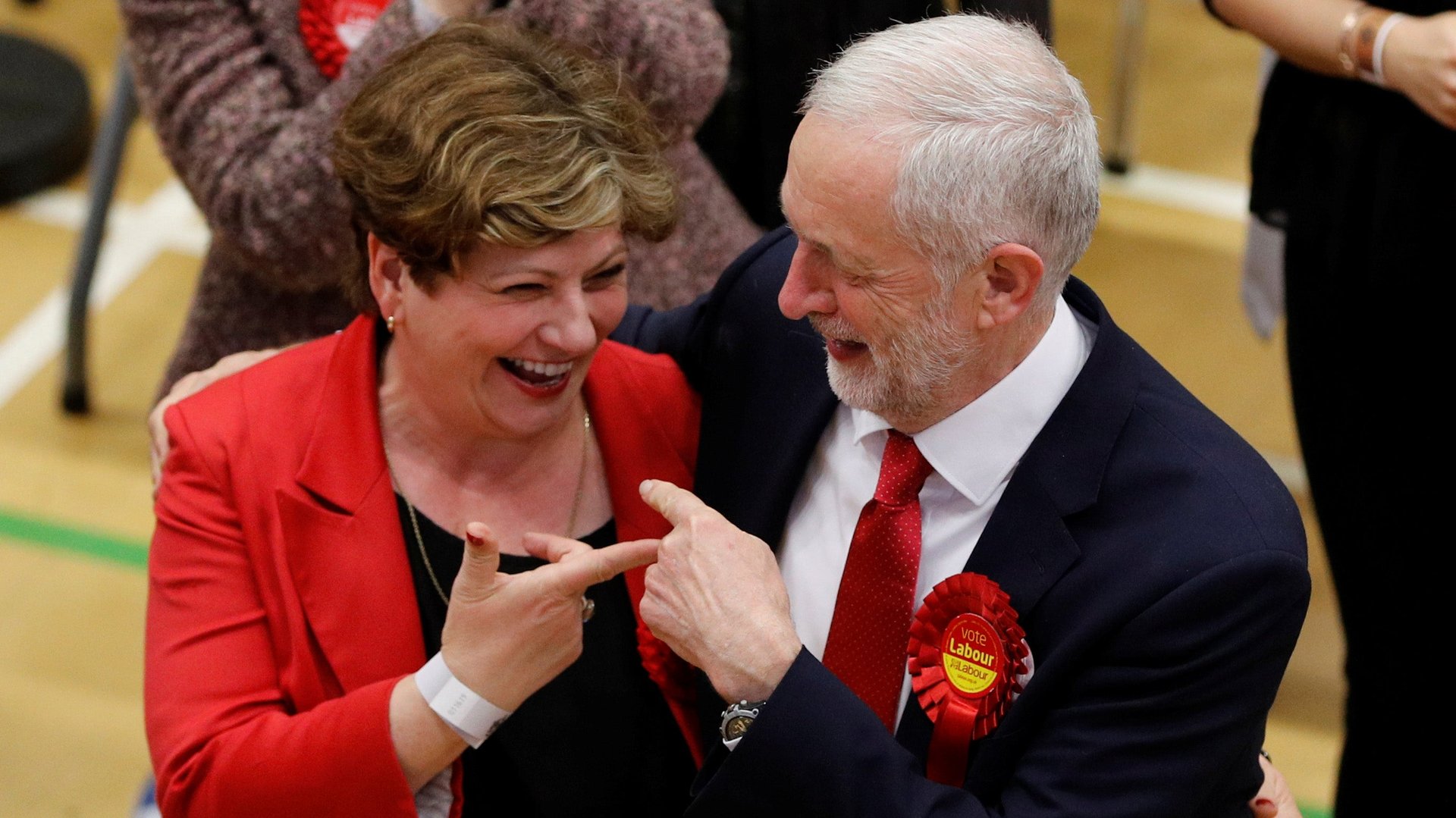The UK election results are in and no one has won. What happens next?
Six weeks ago, British prime minister Theresa May bet that she would win a new election by a landslide, so she unexpectedly called a “snap” general election. On June 8, the voters rebuked her. In the end, amid high turnout, her Conservative Party lost its majority.


Six weeks ago, British prime minister Theresa May bet that she would win a new election by a landslide, so she unexpectedly called a “snap” general election. On June 8, the voters rebuked her. In the end, amid high turnout, her Conservative Party lost its majority.
“This is the most stunning reversal of fortunes,” said a BBC pundit.
The latest BBC forecast puts the Conservatives on 319 seats, eight fewer than needed for a majority in the 650-member parliament. The Labour party is projected to take 261 seats, which would put them 29 seats ahead of where it was before.
That means the UK faces a “hung” parliament, in which no party is able to build a majority government on its own.
The last time this happened was in 2010, which led to the Conservatives and Liberal Democrats forming a coalition government. This time around, however, the math is trickier.
What does this mean for the British government?
For now, Theresa May remains prime minister. Her ability to form a stable government is in doubt, however. The only other leader with a realistic chance to unseat May is Labour leader Jeremy Corbyn, but his path to power is equally murky.
Behind closed doors, party officials will sound each other out to see if they are able to build a majority coalition or arrange some other support agreement. These are the possibilities:
- Conservatives build a majority coalition. The Democratic Unionist Party (DUP) of Northern Ireland won 10 seats, which should be just enough to give a coalition government a majority of three seats. The other parties that could push a Conservative-led government over the line, like the Liberal Democrats, have pledged not to cooperate with the Tories.
- Conservatives try their luck with a minority government. If the Conservatives are unable to build a majority coalition, as the party with most seats it can try to run a minority government. The party would then rely on ad hoc support from others to secure enough votes to pass legislation. The threat of no-confidence motions would loom large, making dissolution a real possibility, which could trigger yet another general election.
- Labour builds a majority coalition. Though unlikely, it is theoretically possible if all other parties agree to join up with Labour, Corbyn would emerge as prime minister. The dynamics of keeping such a motley collection of parties together are daunting, to say the least.
- Labour goes for a minority government. If Labour can’t get enough support to build a majority coalition, but it can cobble together ad hoc agreements with enough parties to suggest it has the support of a majority of members, Labour can try to run a minority government. It would be exceedingly precarious.
The first major deadline for a new government is June 13, when parliament meets for the first time. If May (or Corbyn) is unable to build a coalition by then, there is another test ahead of the Queen’s speech on June 19. A program is presented to the Queen by the person who wants to become prime minster, who must gain a majority of votes in parliament in favor of the plan. Fail at that hurdle, and the feasibility of governing will be called into question.
What does this mean for Brexit?
The official start of Brexit negotiations are due to begin on June 19. Whoever is the prime minister by then is unlikely to have a strong parliamentary mandate. Some European officials have hinted that the political turmoil in the UK may warrant a delay in the talks. Most obviously, if no government is formed by the scheduled start of talks, there will be no government leader to negotiate with.
The erosion of May’s majority suggests a rejection of a so-called “hard” Brexit, which would see the UK quit the EU with few transitional arrangements or preferential deals on trade, immigration, and other issues negotiated beforehand. May’s campaign took an increasingly hard line on Brexit talks, on the (incorrect) assumption this would be a big vote winner.
That said, the prospects of a “soft” Brexit, which would retain many of the benefits of EU membership even after the UK leaves the bloc, are not clear either. Given the political turmoil, there is also a chance for a “no deal” Brexit, in which the time for talks runs out in March 2019 and the divided, disorganized UK is simply ejected from the bloc with no special arrangements in place. This would be the most chaotic option, economically speaking. The sharp drop in the value of the pound following the vote suggests that markets are on edge about it.